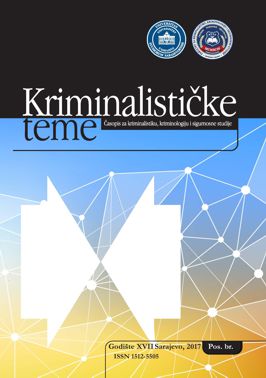PREVENCIJA POREZNOG KRIMINALA DIZAJNIRANJEM FUNKCIJA SIGURNOSNOG MENADŽMENTA
PREVENTION OF TAX CRIME BY DESIGNING THE FUNCTION OF SAFETY MANAGEMENT
Author(s): Edin Čolaković, Suljo Kasapović, Fuad MilićSubject(s): Criminal Law, Security and defense, Criminology, Law on Economics, Fiscal Politics / Budgeting
Published by: Fakultet za kriminalistiku, kriminologiju i sigurnosne studije Univerziteta u Sarajevu
Keywords: safety management; functions; tax evasion;
Summary/Abstract: Reason for writing and research problem(s): As a separate scientific discipline, the safety management its resources, energy, substance and information draws from the basis of modern scientific knowledge management and safety. The projected and expected safety situation, safety management, achieves through innovativeness in the domain of recursive relationships within complex networks, with the encouragement of interdisciplinary holistic synergy, which is achieved by use of a wide range of knowledge of basic managerial and safety and other related social sciences and practical experiences. Aims of the paper (scientific and/or social): The goal of this scientific research is to examine the importance of functions of the safety management, for the purpose of prevention of tax crime. Methodology/Design: The methodology for detecting and proving criminal offenses in this paper includes the application of scientific disciplines of safety management and criminology in the sense of this word (tactics, techniques and methods), or heuristic and silogistic as well as criminal material and criminal law in the function of more effective and effective suppression and prevention of economic crime in the area of tax legislation. The methodological framework procedure in this study is designed in several phases and research procedures, in order to provide a guarantee of the objectivity, or the scientific truth of the acquired knowledge. Scientific-research methods have been applied in the paper: observation, analysis, synthesis, classification, specialization, induction, deduction, normative method, historical method, case analysis, content analysis, test method, survey, comparision and introspection, as well as scientific and theoretical knowledge, relevant literature, and contemporary business practice. Research/Paper limitation: The research was conducted in the territory of Bosnia and Herzegovina at a given time. With the aim of further research, it would be interesting to include respondents from the regional environment in terms of acquiring new knowledge. Notwithstanding the above, I consider that these limitations do not reduce the study results but represent the fundamentals and valid challenge for further work.
Journal: Kriminalističke teme – Časopis za kriminalistiku, kriminologiju i sigurnosne studije
- Issue Year: XVII/2017
- Issue No: 5
- Page Range: 31-50
- Page Count: 20
- Language: Bosnian, Croatian, Serbian

